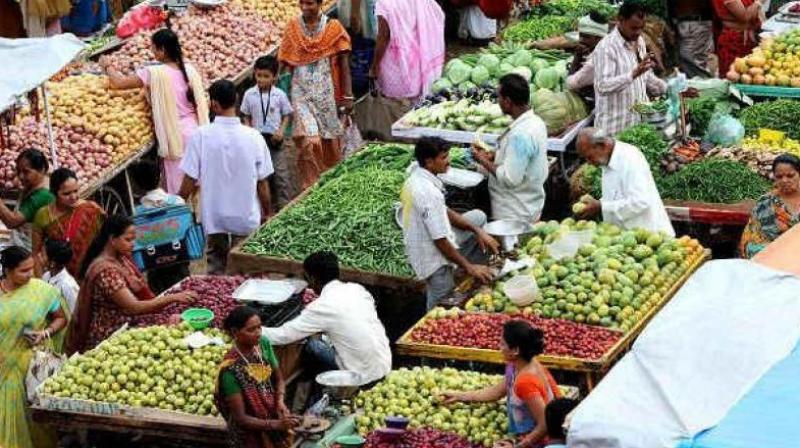RBI pegs retail inflation at 4.8 per cent for second half of FY 2019
Retail inflation has been projected to rise further to 5 per cent in the first quarter of next financial year 2019-20.

Mumbai: The Reserve Bank on Wednesday pegged retail inflation at 4.8 per cent for the second half of current fiscal expecting increase in food prices due to hike in minimum support price (MSP).
For the July-September quarter, it has projected inflation to be at 4.6 per cent. RBI made the projections in its third monetary policy review for the current fiscal. Retail inflation has been projected to rise further to 5 per cent in the first quarter of next financial year 2019-20. "The inflation outlook is likely to be shaped by several factors.
First, the central government has decided to fix the minimum support prices (MSPs) of at least 150 per cent of the cost of production for all kharif crops for the sowing season of 2018-19.
"This increase in MSPs for kharif crops, which is much larger than the average increase seen in the past few years, will have a direct impact on food inflation and second round effects on headline inflation," RBI said in its third bi-monthly policy review.
The Monetary Policy Committee (MPC), chaired by RBI Governor Urjit Patel has raised the benchmark repo rate by 0.25 per cent to 6.25 per cent citing inflation worries, which is likely to make consumer products costlier.
"Based on an assessment..., inflation is projected at 4.6 per cent in Q2, 4.8 per cent in second half (H2) of 2018-19 and 5 per cent in Q1:2019-20, with risks evenly balanced," RBI said. Excluding the HRA impact, the CPI-based inflation is projected at 4.4 per cent in Q2, 4.7-4.8 per cent in H2 and 5 per cent, it added.
On MSP hike, RBI said there is a considerable uncertainty and the exact impact would depend on the nature and scale of the government's procurement operations. "As such, only the incremental increase in MSPs over the average increase in the past will impact inflation projections.
"Second, the overall performance of the monsoon so far augurs well for food inflation in the medium-term. Third, crude oil prices have moderated slightly, but remain at elevated levels. Fourth, the central government has reduced Goods and Services Tax (GST) rates on several goods and services," RBI said.
This will have some direct moderating impact on inflation, provided there is a pass-through of reduced GST rates to retail consumers, it added. Additionally, RBI said the inflation in items excluding food and fuel has been broad-based and has risen significantly in recent months, reflecting greater pass-through of rising input costs and improving demand conditions.
Citing all these reasons and that the financial markets continue to be volatile, RBI said the assessment on inflation is based on all these factors combined.

